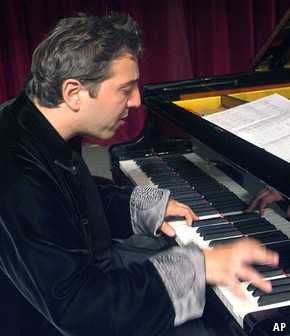Freedom of speech in Turkey
A secularist’s lament
A blasphemy case raises new worries about freedom of speech in Turkey
Apr 20th 2013 | ANKARA |From the print edition

Fazil Say, a tweeting pianist
“I AM not sure if you have noticed, but where there is a louse, a nonentity, a low life, thief or fool, they are all Islamists. Is this a paradox?” So wrote Fazil Say, a renowned Turkish pianist, in one of a series of irreverent tweets poking fun at Islam. Now Mr Say, who has an international career, has been given a ten-month suspended prison sentence under Article 216 of the penal code for hate speech. Prosecutors argued that Mr Say, a self-avowed atheist, had “denigrated the values of a section of the population” through his comments on Twitter. Should he repeat the offence within five years, he faces jail.
Mr Say’s conviction prompted condemnation around the European Union, with which Turkey is in theory negotiating membership. Turkey’s EU minister, Egemen Bagis, conceded that “we cannot be pleased that either Fazil Say or any of our citizens is prosecuted for what they say or think…I wish the courts had evaluated this artist’s steps within the context of his freedom to be absurd.”
The prime minister, Recep Tayyip Erdogan, is unfazed. Asked to comment, he snapped “do not waste our time with such matters.” This reflects his ruling Justice and Development (AK) party’s often contradictory approach. The government is making its most ambitious stab yet at fixing the Kurdish problem through talks with the imprisoned PKK leader, Abdullah Ocalan. It hopes to introduce a new, more democratic constitution. Yet Turkey has become the world’s top jailer of journalists. And thousands of Kurdish activists and politicians are in jail on flimsy terrorism charges. For Turkey’s beleaguered secularists, Mr Say’s plight is more evidence of creeping religious conservatism since AK came to power ten years ago.
Mr Erdogan was himself banned from politics and briefly jailed in 1998 for reciting a poem that incited “religious hatred.” But that was when the generals were using the judiciary to punish critics of Ataturk and secularism. Now it seems to be the turn of AK to use the courts to suppress attacks on Sunni Islam.
Yet prosecutors look the other way when it comes to Jews or Armenians. “Laws to criminalise defamation in Turkey have only ever been implemented to protect the rights of the majority, never against vulnerable minorities,” notes Emma Sinclair-Webb, of Human Rights Watch. Rober Koptas, editor of Agos, an Armenian weekly, complained of failure to pursue those who planned the murder of his predecessor (and father-in-law), Hrant Dink, in 2007. Now Mr Koptas is himself being investigated for “insulting Turkishness”—just as Dink once was.
From the print edition: Europe
via Freedom of speech in Turkey: A secularist’s lament | The Economist.

Leave a Reply